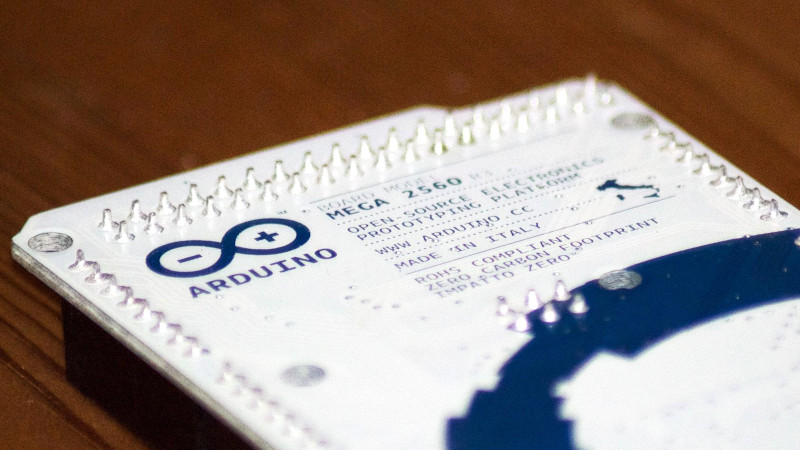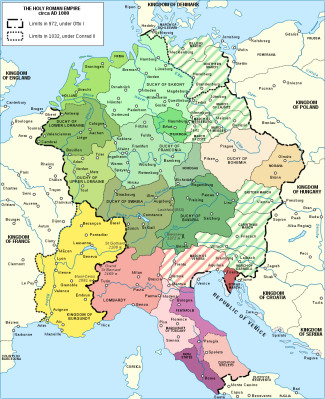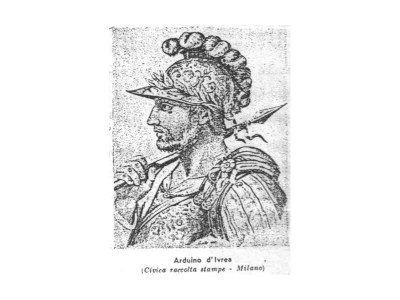The Medieval History Of Your Favourite Dev Board

It’s become something of a trope in our community, that the simplest way to bestow a level of automation or smarts to a project is to reach for an Arduino. The genesis of the popular ecosystem of boards and associated bootloader and IDE combination is well known, coming from the work of a team at the Interaction Design Institute Ivrea, in Northern Italy. The name “Arduino” comes from their favourite watering hole, the Bar di Re Arduino, in turn named for Arduin of Ivrea, an early-mediaeval king.
As far as we can see the bar no longer exists and has been replaced by a café, which appears on the left in this Google Street View link. The bar named for Arduin of Ivrea is always mentioned as a side note in the Arduino microcontroller story, but for the curious electronics enthusiast it spawns the question: who was Arduin, and why was there a bar named after him in the first place?
The short answer is that Arduin was the Margrave of Ivrea, an Italian nobleman who became king of Italy in 1002 and abdicated in 1014. The longer answer requires a bit of background knowledge of European politics around the end of the first millennium, so if you’re ready we’ll take Hackaday into a rare tour of medieval history.
Defying An Empire

Western Europe’s dominant power at the turn of the first millennium was the Holy Roman Empire, a German-ruled agglomeration of states which though not a direct successor to the Roman Empire had received the recognition of the Papacy as such following the accession of a female ruler as empress of the former Eastern Roman empire in Byzantium. Its young Emperor Otto III died unexpectedly in 1002 without an heir, and in the power vacuum that followed the Italian nobility sought to re-establish their control and break away from German influence. Thus they elected one of their own to become King of Italy, selecting Arduin for the throne.
The tumultuous politics of 10th and 11th century Italy seem to revolve around the struggles between the forces controlled by the bishops, largely aligned with or appointed by the Holy Roman Emperor, and those of the nobility who seem to have been alternately on the side of — or fighting against — the Emperor. Arduin had been excommunicated twice, once in Rome before Otto himself and his Papal appointment Sylvester II, after burning the cathedral of Vercelli and killing its bishop.
The Empire Strikes Back

When the newly crowned Emperor Henry II immediately sent a force to depose Arduin, it was repulsed, leading to Henry himself leading a larger army and defeating him in 1004. This and Henry’s subsequent coronation as King of Italy in the city of Pavia might have been the end of the story, but as the newly crowned king and his retinue were driven from the city by rioting it is evident that he did so without the support of his populace. Thus while Arduin had lost control of part of his claimed kingdom he continued to hold power from his base in Ivrea and spent the next decade still asserting himself as King of Italy despite Henry also holding the crown. He was eventually defeated and forced to abdicate in 1013, and died the following year.
If there’s something to take away from this tale of European politics a millennium past, it’s the surprise at how little he leaves us. For other medieval figures there might be a statue or perhaps a fresco in a church, but for Arduin beyond the stylised portrait evidently drawn centuries later we have no depiction of him. If the town of which he was once ruler had not memorialised him in a street name that in turn prompted the owner of a bar to use his name, it’s possible nobody but a few historians would ever have known about him. Perhaps here is a lesson in measuring the legacies of our politicians here in the 21st century.
So we have the love of some Italian post-grads for their favourite watering hole to thank for our familiarity with the name of an obscure medieval king, and now we know a little more about him and his life. Perhaps we should all turn to our local pub for inspiration when naming our projects, though in my case I’m not sure that The Sow And Pigs would be as edifying an appellation.
Header image: SimonWaldherr, CC BY-SA 4.0.

